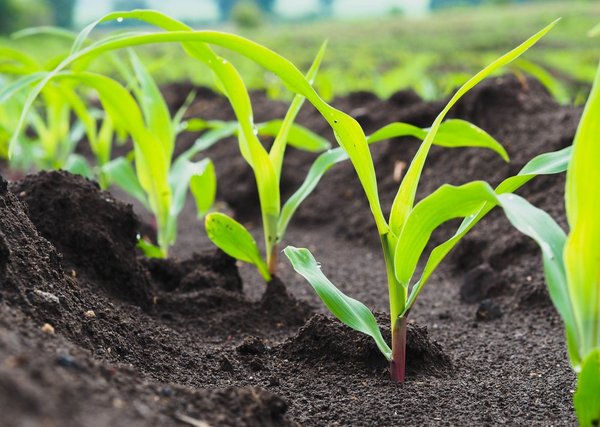- Share this article
- Subscribe to our newsletter
Bacteria help plants grow better
A study conducted by researchers from the University of Bonn in Germany and Southwest University in China sheds light on an unusual interdependence. Maize can attract special soil bacteria which, in turn, help the plants to grow better. The study was published in April 2021 in the magazine Nature Plants.
The researchers studied maize varieties that differ significantly in their yields. They came across an enzyme, flavone synthase 2, in the high-yield inbred line 787. Led by Dr Peng Yu of the Institute of Crop Science and Resource Conservation (INRES) at the University of Bonn, they found large amounts of the enzyme in the plant's roots. "It uses this enzyme to make certain molecules from the flavonoid group and releases them into the soil," Yu explains.
Flavonoids give flowers and fruits their colour. In the soil, however, they perform a different function by ensuring that very specific bacteria accumulate around the roots. These microbes cause the formation of lateral roots. "This allows the maize plant to absorb more nitrogen from the environment," says INRES’ Professor Frank Hochholdinger. "This means the plant grows faster, especially when nitrogen supplies are scarce."
To show how effective the bacteria are, the researchers used the LH93 maize variety, which normally produces rather puny plants. When they planted LH93 in the soil where the high-performance line 787 was previously cultivated, LH93 grew significantly better. The effect disappeared when the botanists sterilised the soil before repotting. This shows that the enriched bacteria are indeed responsible for turbo growth because they were killed during sterilisation.
Results may contribute to more sustainable agriculture
Nitrogen is extremely important for plant growth – so much so that farmers artificially increase its amount in the soil by applying fertiliser. However, some of the fertilizer is washed off the fields into streams with the rain or enters the groundwater. It can also enter the atmosphere in the form of nitrogen oxides or as ammonium gas, where it contributes to the greenhouse effect. Furthermore, the production of nitrogenous fertilisers furthermore requires a great deal of energy. "If we breed crops that can improve their nitrogen usage with the help of bacteria, we might be able to significantly reduce environmental pollution," Yu hopes.
The study shows that plants help to shape the conditions of the soil in which they grow, in ways which ultimately benefit them. However, this aspect has been neglected in breeding until now. Yu adds that, in general, many interactions of the root system with soil organisms are not yet well enough understood.
(University of Bonn/ISAAA/wi)
Reference:
Peng Yu et al.: Plant flavones enrich rhizosphere Oxalobacteraceae to improve maize performance under nitrogen deprivation; Nature Plants; April 2021





Add a comment
Be the First to Comment